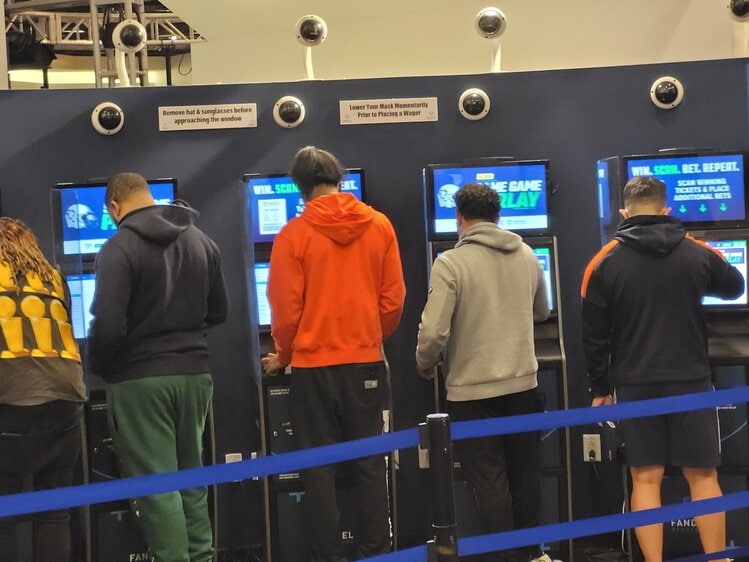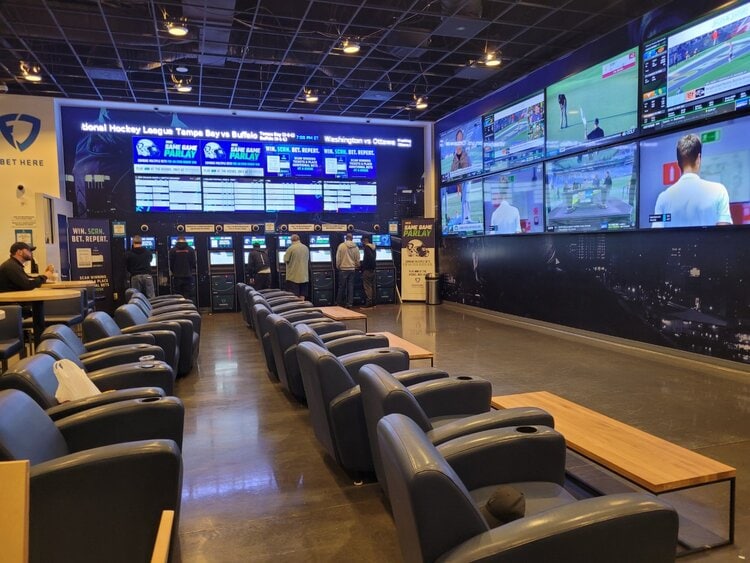From railbirds to football fanatics, a day at the highest-grossing sportsbook on the east coast brings together enthusiasts of all stripes — and drives record-breaking revenue.
EAST RUTHERFORD, N.J. – When visiting the highest-grossing sportsbook on the East Coast, take a moment to stop and stare at the harness racing setup just inside the front door. Chances are a bunch of folks there in the daytime can tell you, chapter-and-verse, about trotters and pacers.
And when those folks go home early in the evening, they cross paths with football, basketball, and baseball fans who want to have a little action on the night’s games and a cozy, comfortable place to watch them.
FanDuel is operating America’s No. 1 sportsbook inside a building abutting the racetrack at the Meadowlands that, until 2018, was grossing most of its money from bar and bat mitzvahs. They turned it into a sportsbook less than two months after the U.S. Supreme Court overturned the Professional and Amateur Sports Protection Act (PASPA) on May 14, 2018, and it is now a bustling sea of humanity on NFL Sundays, college football Saturdays, and any other time there is compelling sports on television.


At what’s officially known as the FanDuel Sportsbook at Meadowlands Racing and Entertainment, nearly five dozen kiosks spread around the 12,500-square-foot building are able to take wagers, and there are humans at the windows, too.
Along with humans at the bar, humans at the snack bar, and humans watching it all from a catbird seat to make sure that expressly prohibited practices like money laundering or wagering by proxy is taking place.
If someone needs to deposit or withdraw funds, those kiosks act like ATMs, too.No bet is too big, but the largest wagers must be placed with a human rather than at one of the automated terminals.
“We have 40% of the online market and more than 50% of the retail market in New Jersey,” FanDuel spokesman Kevin Hennessy said. “We have generated more than 200 jobs for the people of New Jersey in addition to making the Meadowlands Racetrack a daily destination in Bergen County.”

This is probably not what former New Jersey Gov. Chris Christie envisioned when he filed a lawsuit, Christie v. NCAA, which has had the net effect of legalizing sports gambling in more than half of the United States. NBA commissioner Adam Silver had been one of the first to advocate for legalization in a 2014 op-ed for The New York Times, and the NBA’s home state of New York will have legalized wagering before the end of the year if a number of functional obstacles and licensing issues can be worked out.
In the meantime, New Yorkers are flocking to New Jersey to place their bets, and in September, New Jersey grossed more than $1 billion in sports gambling revenue for the first time. Since PASPA was overturned, New Jersey has handled $18.992 billion in wagers.
Compare that to Nevada’s $16.836 billion.
This type of action is why legalized sports gambling has become one of America’s biggest growth industries, with epic gains for everyone from JB Smoove, star of both Curb Your Enthusiasm and Caesars Sportsbook’s ad campaigns, to any investor who saw this whole thing coming.

If you bought 1,000 shares of Flutter Entertainment (the parent company of FanDuel) stock when the pandemic hit in March, 2020, you would have laid out $35,393 that would now be worth just over $100,000; the stock was trading at $100.35 at midday Tuesday. If you had bought 1,000 shares of Penn National Gaming stock, it would have cost you $7,890 but would now be worth $74,390, down from an all-time high of $130,437 this past March).
Even FanDuel’s biggest competitor, DraftKings, has seen its stock go nuts — that same purchase of 1,000 shares, if made back in March 2020, would have grown from a purchase price of $11,480 to a value of $46,110 at midday Tuesday, Oct. 26.
Over the last few years, sports fans have been inundated with an avalanche of advertisements from the companies trying to beat each other out in this highly competitive space, a dynamic that resembles the dawn of Daily Fantasy Sports in the United States a decade back when proper gambling was only allowed in Nevada (and in Delaware, in limited form, on Sundays). Back then, the industry was held in low regard by a majority of the public, but was keeping a bunch of people employed, be it bookies around the country, ticket windows in Nevada, or handicappers across the Internet who actually make a living by selling picks.
The US government keeps an eye on everything through the FBI, and they are quick to alert both the leagues and the sportsbooks if they are seeing lopsided action that might signal a fixed game, but perhaps surprisingly,the industry has not been hit by any major point-shaving or other gambling-related scandals in the three-plus years since PASPA was overturned. What the industry has seen instead is money pouring in. Lots of money, in fact — some of it in the form of dollars that would have otherwise been spent on commuting costs or concert and theater tickets or airline tickets or a hundred other things that suddenly became unavailable when the pandemic hit.
When pro and collegiate sports actually returned in summer and fall 2020, some enthusiasts had more money than they knew what to do with, and many of them started wagering on sports. FanDuel was there for them from the get-go, and the lines at the Meadowlands stretched all the way to the sidewalk a couple hundred yards from the front door on the busiest days.
“We have generated more than 200 jobs for the people of New Jersey in addition to making the Meadowlands Racetrack a daily destination in Bergen County,” Hennessy said. “We knew the retail Sportsbook would be popular, but the crowds have really surpassed our expectations. The team works hard to manage the lines and the Meadowlands has been amazing in giving us more space. The retail sportsbook is full of energy when games are on and is one of the most exciting places to watch and enjoy sports in the state. You don’t have to be a bettor to enjoy the atmosphere.”
Many of those not placing wagers on human sporting events are instead dropping a few bucks on the horses. Thoroughbred and harness racing were once the two most wagered-upon sports in America, and although they now attract a demographic much older than the folks wagering on sports overall, they are a loyal lot who not only keep track of the races run at the Meadowlands but also take in simulcasts from horse tracks across America, many of which have been converted to hybrid facilities — something that has allowed the harness and thoroughbred industries to survive despite a plummet in popularity. Ask anyone who has ever enjoyed a summer afternoon at Saratoga or Santa Anita, and they will agree.
Some things don’t change. But now, those old-schoolers have a whole lot more company at the Meadowlands than they used to.